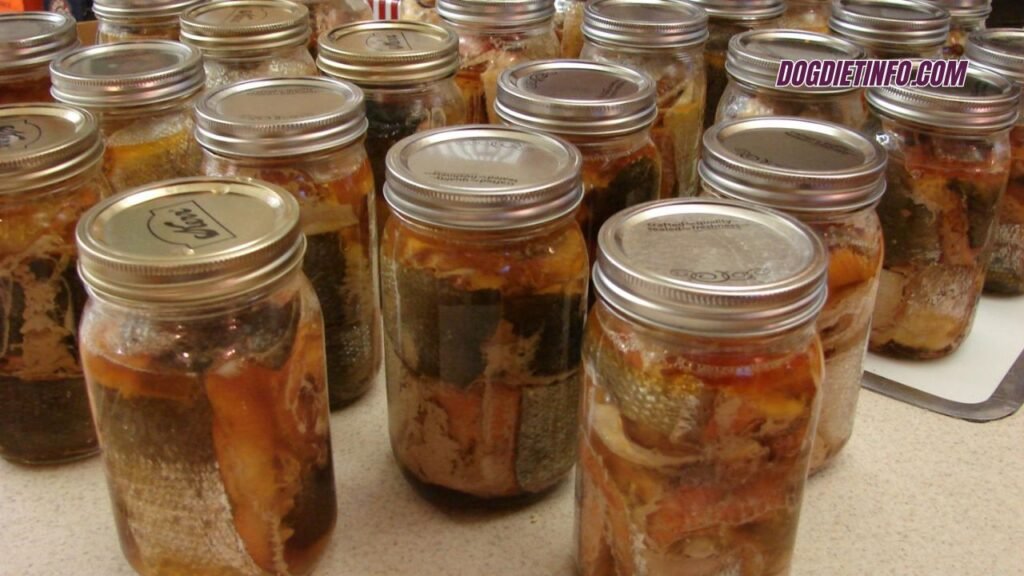Is Canned Salmon Good For Dogs? Canned salmon can be good for dogs as it provides essential omega-3 fatty acids and protein.
Dogs are more than just pets—they’re family members. As such, pet owners often want to provide them with the best nutrition possible. However, understanding which human foods are safe and beneficial for dogs can be challenging.
While some human foods are highly nutritious for dogs, others can pose serious health risks. One such food that raises questions is canned salmon.
Known for its rich flavor and nutritional benefits for humans, is canned salmon a good addition to a dog’s diet? Canned salmon is a pantry staple in many households, prized for its convenience and health benefits.
It is high in protein and omega-3 fatty acids, which are vital for human health. But when it comes to dogs, is it safe to offer them this fishy treat?
In this article, we will dive deep into the pros and cons of feeding canned salmon to dogs, its nutritional benefits, potential risks, and the best practices to follow to ensure your dog stays healthy and happy.
Contents
What is Canned Salmon?
Types of Canned Salmon
Canned salmon comes in several varieties, each with its unique preparation and packaging method:
- Canned Salmon in Water: This is often the safest type for dogs as it usually contains no added salt or oils. It preserves most of the salmon’s natural flavor and nutrients.
- Canned Salmon in Oil: While this version can be more flavorful, the added oil might not be suitable for dogs, especially those with sensitive stomachs or those prone to weight gain. The excess fat can cause digestive upset and lead to pancreatitis in severe cases.
- Canned Salmon with Added Salt: Salt is often added to canned foods to enhance flavor and increase shelf life. However, high sodium content can be dangerous for dogs, leading to salt poisoning, excessive thirst, and even kidney damage in extreme cases.
- Canned Salmon with Bones: While most canned salmon is pressure-cooked, softening the bones to make them edible for humans, these bones can still pose a choking hazard or cause internal damage to dogs if not properly handled.
Nutritional Profile of Canned Salmon
Canned salmon is packed with essential nutrients that make it a healthy choice for humans and dogs alike:
- Omega-3 Fatty Acids: Essential for reducing inflammation, supporting heart health, and promoting healthy skin and coat in dogs.
- Protein: Vital for muscle development, tissue repair, and overall body maintenance. [Is Canned Salmon Good For Dogs?]
- Vitamins (B12 and D): Vitamin B12 helps with neurological function and red blood cell formation, while Vitamin D is crucial for bone health.
- Minerals (Selenium, Potassium, and Magnesium): Selenium acts as an antioxidant, potassium helps regulate fluid balance and nerve signals, and magnesium supports muscle function.
Is Canned Salmon Safe for Dogs?
Choosing the Right Canned Salmon
When feeding canned salmon to dogs, the type you choose is of paramount importance. Opt for salmon packed in water with no added salt or preservatives.
Always read the label carefully to ensure there are no hidden ingredients that could harm your pet. Avoid salmon that contains spices, onions, garlic, or other additives that are toxic to dogs.
Risks of Certain Ingredients
Feeding your dog canned salmon with added salt or preservatives can lead to a range of health issues, from mild gastrointestinal upset to severe conditions like kidney damage.
Furthermore, canned salmon that contains bones can pose a choking hazard or cause internal injuries if not handled properly. Always check for small bones and remove them before serving.

Benefits of Canned Salmon for Dogs
Omega-3 Fatty Acids for Dogs
Omega-3 fatty acids are a type of polyunsaturated fat that provides several health benefits for dogs:
- Improved Coat and Skin Health: Omega-3s can help alleviate skin conditions like dryness, itching, and flakiness. They can also reduce shedding and promote a shiny, healthy coat.
- Anti-Inflammatory Properties: These fatty acids can help manage inflammatory conditions like arthritis, helping older dogs or those with joint issues move more comfortably.
- Supports Brain Health: Omega-3s are beneficial for cognitive function, particularly in senior dogs, as they help maintain brain health and may reduce the risk of cognitive decline.
High-Quality Protein Source
Protein is one of the most important nutrients in a dog’s diet, playing a crucial role in various bodily functions:
- Muscle Development and Repair: Protein is essential for muscle growth and recovery, especially in active or working dogs.
- Immune System Support: Proteins contribute to the production of antibodies, helping the immune system fight off infections.
- Energy Production: Proteins provide energy for daily activities, keeping dogs active and playful. [Is Canned Salmon Good For Dogs?]
How to Feed Canned Salmon to Dogs?
Recommended Serving Sizes and Frequency
While canned salmon is nutritious, it should be offered in moderation. A balanced approach is key to ensuring your dog benefits from the nutrients without any adverse effects:
- Small Dogs: Start with a small amount, like half a tablespoon, mixed into their regular dog food once or twice a week. [Is Canned Salmon Good For Dogs?]
- Medium to Large Dogs: One to two tablespoons of canned salmon, mixed with their meals a few times a week, is generally safe.
- Monitor for Reactions: Always introduce new foods gradually and watch for signs of digestive upset or allergic reactions.
Preparation Tips for Safety
To safely feed canned salmon to dogs, consider the following preparation tips:
- Rinse Off Excess Salt: Even if the canned salmon is labeled “no added salt,” rinsing it under running water can help remove any residual sodium.
- Check for Bones: Always inspect the salmon for small bones that could pose a choking hazard or cause injury. [Is Canned Salmon Good For Dogs?]
- Mix with Regular Food: Canned salmon can be mixed with your dog’s regular kibble or wet food to add flavor and nutrients without overwhelming their digestive system.
Potential Risks of Feeding Canned Salmon to Dogs
Allergic Reactions and Sensitivities
Like humans, dogs can have allergies or sensitivities to certain foods, including fish:
- Common Symptoms: Look for signs such as itching, swelling, vomiting, diarrhea, or changes in behavior. If you notice any of these symptoms, discontinue feeding salmon and consult your veterinarian.
- Elimination Diet: If you suspect a fish allergy, consider conducting an elimination diet under the guidance of a vet to identify the specific allergen.
Mercury Exposure Concerns
While salmon is generally lower in mercury than other types of fish, it is still a valid concern:
- Mercury Buildup: Over time, regular consumption of fish containing mercury can lead to a buildup in a dog’s system, potentially causing toxicity.
- Rotating Protein Sources: To mitigate this risk, rotate canned salmon with other protein sources like chicken, turkey, or lean beef. [Is Canned Salmon Good For Dogs?]
Digestive Issues from Overfeeding
Too much canned salmon can lead to digestive problems:
- Diarrhea and Upset Stomach: Overfeeding can cause loose stools, vomiting, or an upset stomach, especially if the dog is not accustomed to rich foods.
- Pancreatitis: High-fat foods like canned salmon in oil can increase the risk of pancreatitis, a potentially life-threatening condition characterized by inflammation of the pancreas.
Alternatives to Canned Salmon
Other Safe Fish Options
If you’re cautious about feeding your dog canned salmon or want to add variety to their diet, consider these other fish options:
- Sardines (in Water, No Salt): Sardines are rich in omega-3s, calcium, and protein and are easier to digest for most dogs.
- Mackerel: This fish is high in omega-3s and provides a good alternative to salmon without the high mercury risk. [Is Canned Salmon Good For Dogs?]
- Cooked Fresh Fish: Fresh salmon, whitefish, or trout, cooked without seasoning, are also excellent options.
Fresh Salmon vs. Canned Salmon
Fresh salmon can be a healthier alternative to canned salmon:
- No Preservatives: Fresh salmon does not contain the added salt or preservatives often found in canned varieties.
- Higher Nutritional Value: Cooking fresh salmon at home allows you to retain more of its natural nutrients.
- Preparation Tips: Always cook fresh salmon thoroughly and remove any bones to ensure it’s safe for your dog. [Is Canned Salmon Good For Dogs?]
Final Verdict
Feeding canned salmon to dogs has its advantages and disadvantages:
- Pros: Rich in omega-3 fatty acids, high-quality protein, vitamins, and minerals that promote overall health, coat condition, and joint health.
- Cons: Risks of added salt, bones, preservatives, allergic reactions, and potential mercury exposure.
Canned salmon can be a healthy supplement to your dog’s diet when prepared correctly and fed in moderation. [Is Canned Salmon Good For Dogs?]
Always consult your veterinarian before introducing new foods to ensure it aligns with your dog’s specific dietary needs.
See Also: Is Rachael Ray Nutrish Good For Dogs?
FAQs
Can Puppies Eat Canned Salmon?
Yes, puppies can eat canned salmon in small, moderated amounts. Ensure it is plain, boneless, and free from added salt or preservatives to avoid any digestive issues.
Should I Cook Canned Salmon Before Feeding It to My Dog?
No, canned salmon is already cooked during the canning process. However, it’s advisable to rinse it and remove any bones before feeding it to ensure safety. [Is Canned Salmon Good For Dogs?]
Can Dogs Eat Canned Salmon with Bones?
It’s best to avoid feeding dogs canned salmon with bones, even if they appear soft. Small bones can still pose a choking hazard or cause injuries to the digestive tract.
Is Canned Salmon in Oil Safe for Dogs?
Canned salmon in oil is not recommended for dogs as it can lead to digestive upset and unnecessary fat intake, increasing the risk of pancreatitis. Opt for salmon packed in water instead.
How Often Can I Give My Dog Canned Salmon?
Canned salmon can be given to your dog once or twice a week in small portions. It’s important to vary their diet to provide balanced nutrition and avoid mercury buildup.
Conclusion: Is Canned Salmon Good For Dogs?
Canned salmon can be a nutritious treat for dogs when prepared carefully and offered in moderation. [Is Canned Salmon Good For Dogs?]
With its high omega-3 fatty acid content and protein, it can support your dog’s overall health, skin, and coat condition.
However, it is crucial to choose the right type of canned salmon, prepare it properly, and consult your veterinarian for personalized advice.
By doing so, you can safely introduce this delicious fish into your dog’s diet and reap the benefits without any risks.

Derrick Wilcox is a certified canine behaviorist with over 12 years of experience at Happy Paws Animal Clinic and Pawsitive Training Center, helping pet owners ensure safer, healthier, and happier lives for their dogs.



